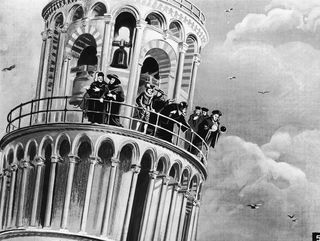Education
Hypotheses Versus Predictions
Hypotheses and predictions are not the same thing.
Posted January 12, 2018

Blogs are not typically places where professors post views about arcane matters. But blogs have the advantage of providing places to convey quick messages that may be of interest to selected parties. I've written this blog to point students and others to a spot where a useful distinction is made that, as far as I know, hasn't been made before. The distinction concerns two words that are used interchangeably though they shouldn't be. The words are hypothesis (or hypotheses) and prediction (or predictions).
It's not uncommon to see these words swapped for each other willy-nilly, as in, "We sought to test the hypothesis that the two groups in our study would remember the same number of words," or "We sought to test the prediction that the two groups in our study would remember the same number of words." Indifference to the contrast in meaning between "hypothesis" and "prediction" is unfortunate, in my view, because "hypothesis" and "prediction" (or "hypotheses" and "predictions") mean very different things. A student proposing an experiment, or an already-graduated researcher doing the same, will have more gravitas if s/he states a hypothesis from which a prediction follows than if s/he proclaims a prediction from thin air.
Consider the prediction that the time for two balls to drop from the Tower Pisa will be the same if the two balls have different mass. This is the famous prediction tested (or allegedly tested) by Galileo. This experiment — one of the first in the history of science — was designed to test two contrasting predictions. One was that the time for the two balls to drop would be the same. The other was that the time for the heavier ball to drop would be shorter. (The third possibility, that the lighter ball would drop more quickly, was logically possible but not taken seriously.) The importance of the predictions came from the hypotheses on which they were based. Those hypotheses couldn't have been more different. One stemmed from Aristotle and had an entire system of assumptions about the world's basic elements, including the idea that motion requires a driving force, with the force being greater for a heavier object than a lighter one, in which case the heavier object would land first. The other hypothesis came from an entirely different conception which made no such assumptions, as crystallized (later) by Newton. It led to the prediction of equivalent drop times. Dropping two balls and seeing which, if either, landed first was a more important experiment if it was motivated by different hypotheses than if it was motivated by two different off-the-cuff predictions. Predictions can be ticked off by a monkey at a typewriter, so to speak. Anyone can list possible outcomes. That's not good (interesting) science.
Let me say this, then, to students or colleagues reading this (some of whom might be people to whom I give the URL for this blog): Be cognizant of the distinction between "hypotheses" and "predictions." Hypotheses are claims or educated guesses about the world or the part of it you are studying. Predictions are derived from hypotheses and define opportunities for seeing whether expected consequences of hypotheses are observed. Critically, if a prediction is confirmed — if the data agree with the prediction — you can say that the data are consistent with the prediction and, from that point onward you can also say that the data are consistent with the hypothesis that spawned the prediction. You can't say that the data prove the hypothesis, however. The reason is that any of an infinite number of other hypotheses might have caused the outcome you obtained. If you say that a given data pattern proves that such-and-such hypothesis is correct, you will be shot down, and rightly so, for any given data pattern can be explained by an infinite number of possible hypotheses. It's fine to say that the data you have are consistent with a hypothesis, and it's fine for you to say that a hypothesis is (or appears to be) wrong because the data you got are inconsistent with it. The latter outcome is the culmination of the hypothetico-deductive method, where you can say that a hypothesis is, or seems to be, incorrect if you have data that violates it, but you can never say that a hypothesis is right because you have data consistent with it; some other hypothesis might actually correspond to the true explanation of what you found. By creating hypotheses that lead to different predictions, you can see which prediction is not supported, and insofar as you can make progress by rejecting hypotheses, you can depersonalize your science by developing hypotheses that are worth disproving. The worth of a hypothesis will be judged by how resistant it is to attempts at disconfirmation over many years by many investigators using many methods.
Some final comments.... First, hypotheses don't predict; people do. You can say that a prediction arose from a hypothesis, but you can't say, or shouldn't say, that a hypothesis predicts something.
Second, beware of the admonition that hypotheses are weak if they predict no differences. Newtonian mechanics predicts no difference in the landing times of heavy and light objects dropped from the same height at the same time. The fact that Newtonian mechanics predicts no difference hardly means that Newtonian mechanics is lightweight. Instead, the prediction of no difference in landing times demands creation of extremely sensitive experiments. Anyone can get no difference with sloppy experiments. By contrast, getting no difference when a sophisticated hypothesis predicts none and when one has gone to great lengths to detect even the tiniest possible difference ... now that's good science.
Third and finally, according to the hypothesis that a blog about hypotheses versus predictions will prove informative, the prediction that follows is that those who read and heed this blog will exhibit less confusion about which term to use when. More important, they will exhibit greater gravitas and deeper thoughtfulness as they generate their hypotheses and subsequent predictions. I hope this blog will prove useful. Its utility will be judged by how long it takes to disconfirm the prediction I have just advanced.


